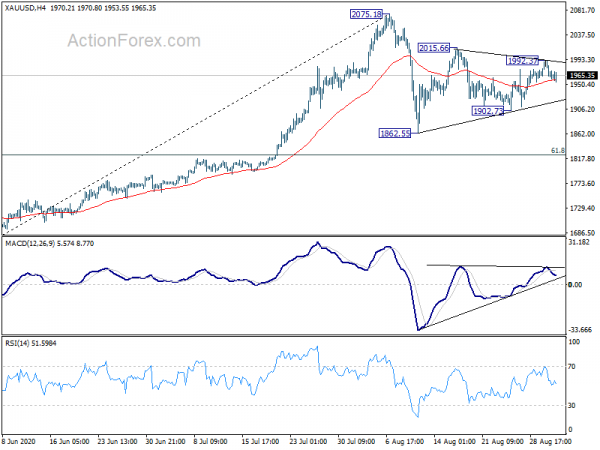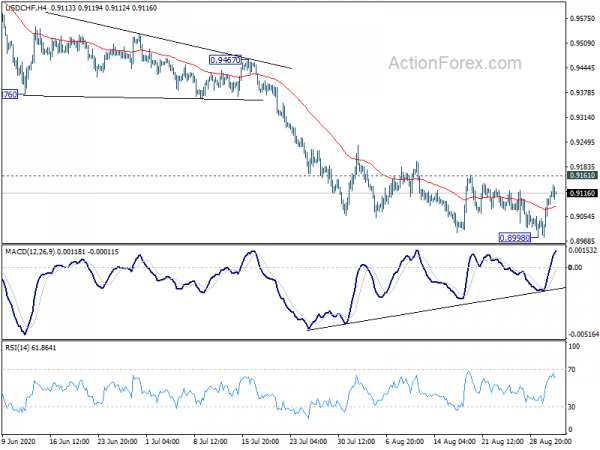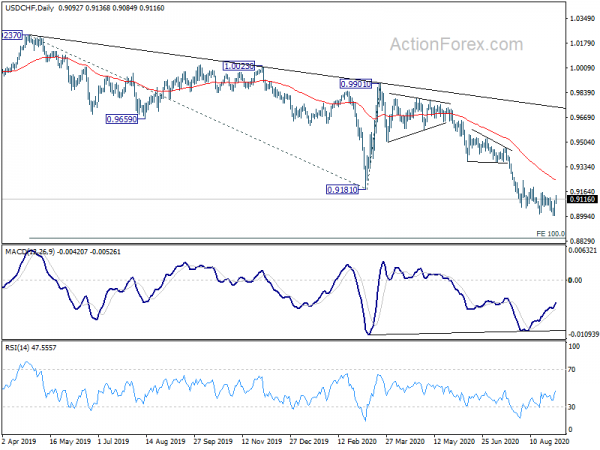Dollar remains generally firm into US session as corrective recovery continues. Much weaker than expected ADP job data is ignored by traders. US stocks are also set to open higher with S&P 500 and NASDAQ extending the record runs. Australian Dollar is currently the weakest one, extending its correction too, after GDP disappointment. Euro is following as the second weakest, then Sterling.
Technically, there is no key resistance level taken out by the greenback yet. 1.1762 support in EUR/USD, 0.9161 resistance in USD/CHF, and to a lesser extend 107.05 resistance in USD/JPY remain the key to gauge if Dollar is staging a genuine rebound. 1902.73 support in Gold is also a key level, but it, at least, have to take out 4 hour 55 EMA firmly first.
In Europe, currently, FTSE is up 1.42%. DAX is up 1.94%. CAC is up 2.21%. German 10-year yield is down -0.044 at -0.458. Earlier in Asia, Nikkei rose 0.47%. Hong Kong HSI dropped -0.26%. China Shanghai SSE dropped -0.17%. Singapore Strait Times rose 0.05%. Japan 10-year JGB yield rose 0.0002 to 0.045.
US ADP jobs rose 428k only, well below expectations
US ADP report showed 428k growth in private sector jobs in August, well below expectation of 1250k. By company size, small businesses added 52k jobs. Medium businesses added 79k. Large businesses rose 298k. By sector, goods-producing jobs rose 40k. Service-providing jobs gained 389k.
“The August job postings demonstrate a slow recovery,” said Ahu Yildirmaz, vice president and co-head of the ADP Research Institute. “Job gains are minimal, and businesses across all sizes and sectors have yet to come close to their pre-COVID-19 employment levels.”
Eurozone PPI at 0.6% mom, -3.3% yoy in Jul
Eurozone PPI came in at 0.6% mom, -3.3% yoy in July, above expectation of 0.5% mom, -3.9% yoy. Industrial producer prices increased by 2.1% mom in the energy sector, by 0.4% mom for durable consumer goods and by 0.1% mom for intermediate goods, while prices remained stable for capital goods and decreased by -0.2% mom for non-durable consumer goods. Prices in total industry excluding energy remained stable.
EU PPI rose came in at 0.4% mom, -3.0% yoy. Over the month, the highest increases in industrial producer prices were recorded in Belgium (+2.3% mom), Spain (+1.8% mom) and Bulgaria (+1.6% mom), while the largest decreases were observed in Cyprus (-2.2% mom), Estonia (-2.1% mom) and Sweden (-0.8% mom).
From Germany, retail sales dropped -0.9% mom in July, well below expectation of 0.5% mom.
BoJ Wakatabe: Necessary to be vigilant against risk of decline in inflation
BoJ Deputy Governor Masazumi Wakatabe warned today that “it’s necessary to be vigilant against the risk of a decline in the inflation rate.” Temporary external shocks like the coronavirus pandemic could lead to persistent stagnation. And, “in order to address both upside and downside risks to prices, the BOJ must continue to strongly commit itself to achieving its price target.”
Additionally, he said the BoJ must “constantly have deep discussions” on improving its policy. “It’s necessary to give further consideration to what kind of monetary policy should be taken in the COVID-19 era, while referring to discussions being held at other central banks.”
Wakatabe also hailed Fed’s average inflation target adoption as a “historical decision”. “The Fed has set a new target. But for monetary policy, there is always the question on what tools and communication means a central bank has to achieve its goal,” he added, “as such, we’d like to cautiously examine what effect the creation of the target could have” on the economy.
Released from Japan, monetary base rose 11.5% yoy in August, above expectation of 11.4% yoy.
Japan Suga confirms to run for LDP leadership, pledges to continue Abenomics
Japanese Chief Cabinet Secretary Yoshihide Suga formally announced to run for leadership of the ruling Liberal Democratic Party, to become the next Prime Minister as Shinzo Abe steps down. Suga, a favorite of the LDP and financial markets, pledged that he would “maintain and push forward” with the “Abenomics” pursued by Abe. He also pledged to maintain the current relationship with BoJ.
A slimmed-down election with members of the parliament would be held on September 14. Suga’s main competition comes from former defence minister, Shigeru Ishiba, and ex-foreign minister Fumio Kishida. In particular Ishiba is so far seen has the most popular candidate among the public, pushing for changes.
Australia GDP contracted record -7.0% in Q2, significant fall in household spending
Australia GDP contracted -7.0% qoq in Q2, worst than expectation of -6.0% qoq. That’s the largest quarterly decline on record since 1959. Combined with Q1’s -0.3% qoq decline, technical recession is confirmed for the country. Looking at some details, private demand detracted -7.9% from GDP, driving by -12.1% decline in household final consumption expenditure. Services spending dropped -17.6% too. Net trade contributed 1.0% to GDP. Public demand contributed 0.6%.
After the release, Treasurer Josh Frydenberg said “Today’s national accounts confirm the devastating impact on the Australian economy from COVID-19… Our record run of 28 consecutive years of economic growth has now officially come to an end. The cause? A once-in-a-century pandemic.”
Nevertheless, “Australia’s economic performance sits among the top of those developed nations as a result of our health and our economic plan to fight the virus,” he added. “Our priority has and will continue to be saving lives and ensuring that Australia’s healthcare system has the capacity to test, trace and treat coronavirus cases.”
RBNZ Orr actively preparing a package of additional monetary policy tools
RBNZ Governor Adrian Orr said in a speech that the early policy actions on the pandemic, including significant reduction in the Official Cash Rate, and introduction of the Large Scale Asset Purchases, “have been effective in lowering interest rates across the board, and ensuring there is plentiful liquidity in the financial system.”
He added that RBNZ is “actively preparing a package of additional monetary policy tools to use if needed”. The tools include “negative wholesale interest rates, further quantitative easing, direct lending to banks, and ongoing forward guidance about our intentions.” While some of the tools are “unfamiliar to many New Zealanders,” he noted, “they are used widely internationally”.
Released from New Zealand, terms of trade index rose 2.5% in Q2, above expectation of 0.6%.
USD/CHF Mid-Day Outlook
Daily Pivots: (S1) 0.9028; (P) 0.9065; (R1) 0.9130; More…
USD/CHF is still bounded in range of 0.8998/9161 and intraday bias remains neutral first. Further decline is expected as long as 0.9161 resistance holds. On the downside, break of 0.8998 temporary low will resume larger down trend to 100% projection of 1.0237 to 0.9181 from 0.9901 at 0.8845. Nevertheless, sustained break of 0.9161 will confirm short term bottoming, and turn bias to the upside for stronger rebound, to 55 day EMA (now at 0.9242).
In the bigger picture, decline from 1.0237 is seen as the third leg of the pattern from 1.0342 (2016 low), which is still extending. Sustained trading below 100% projection of 1.0342 to 0.9186 from 1.0237 at 0.9081 will pave the way to 138.2% projection at 0.8639. On the upside, break of 0.9376 resistance is needed to be the first sign of medium term bottoming.
Economic Indicators Update
| GMT | Ccy | Events | Actual | Forecast | Previous | Revised |
|---|---|---|---|---|---|---|
| 22:45 | NZD | Terms of Trade Index Q2 | 2.50% | 0.60% | -0.70% | -0.06% |
| 23:01 | GBP | BRC Shop Price Index Y/Y Jul | -1.60% | -1.30% | ||
| 23:50 | JPY | Monetary Base Y/Y Aug | 11.50% | 11.40% | 9.80% | |
| 01:30 | AUD | GDP Q/Q Q2 | -7.00% | -6.00% | -0.30% | |
| 06:00 | EUR | Germany Retail Sales M/M Jul | -0.90% | 0.50% | -1.60% | -1.90% |
| 09:00 | EUR | PPI M/M Jul | 0.60% | 0.50% | 0.70% | |
| 09:00 | EUR | PPI Y/Y Jul | -3.30% | -3.90% | -3.70% | |
| 12:15 | USD | ADP Employment Change Aug | 428K | 1250K | 167K | 212K |
| 14:00 | USD | Factory Orders M/M Jul | 5.00% | 6.20% | ||
| 14:30 | USD | Crude Oil Inventories | -2.0M | -4.7M | ||
| 18:00 | USD | Fed’s Beige Book |



